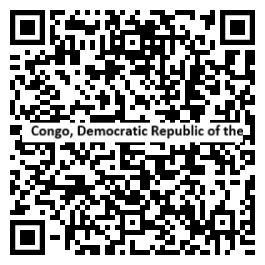Country Summary




Introduction
Background
The Kingdom of Kongo ruled the area around the mouth of the Congo River from the 14th to 19th centuries. European exploration of the Congo Basin in the 1870s brought the Congo territory under Belgian control. The Republic of the Congo gained its independence from Belgium in 1960. The country’s name was changed to Zaire in 1971 and to Democratic Republic of the Congo in 1997.
Geography
Area
total: 2,344,858 sq km
land: 2,267,048 sq km
water: 77,810 sq km
Climate
tropical; hot and humid in equatorial river basin; cooler and drier in southern highlands; cooler and wetter in eastern highlands; north of Equator - wet season (April to October), dry season (December to February); south of Equator - wet season (November to March), dry season (April to October)
Natural resources
cobalt, copper, niobium, tantalum, petroleum, industrial and gem diamonds, gold, silver, zinc, manganese, tin, uranium, coal, hydropower, timber
People and Society
Population
108,407,721 (2022 est.)
Ethnic groups
more than 200 African ethnic groups of which the majority are Bantu; the four largest tribes - Mongo, Luba, Kongo (all Bantu), and the Mangbetu-Azande (Hamitic) - make up about 45% of the population
Languages
French (official), Lingala (a lingua franca trade language), Kingwana (a dialect of Kiswahili or Swahili), Kikongo, Tshiluba
Religions
Roman Catholic 29.9%, Protestant 26.7%, other Christian 36.5%, Kimbanguist 2.8%, Muslim 1.3%, other (includes syncretic sects and indigenous beliefs) 1.2%, none 1.3%, unspecified 0.2% (2014 est.)
Population growth rate
3.14% (2022 est.)
Government
Government type
semi-presidential republic
Capital
name: Kinshasa
Executive branch
chief of state: President Felix TSHISEKEDI (since 24 January 2019)
head of government: Prime Minister Anatole Collinet MAKOSSO (since 12 May 2021); Deputy Prime Ministers Jose MAKILA, Leonard She OKITUNDU, Henri MOVA Sankanyi (since February 2018)
Legislative branch
description: bicameral Parliament or Parlement consists of:
Senate (109 seats; 109 members to include 108 indirectly elected by provincial assemblies by proportional representation vote to serve 5-year terms and a former president, appointed for life)
National Assembly (500 seats; 439 members directly elected in multi-seat constituencies by proportional representation vote and 61 directly elected in single-seat constituencies by simple majority vote; members serve 5-year terms)
Economy
Economic overview
very poor, large, natural resource-rich sub-Saharan country; possesses the world’s second largest rainforest; increasing Chinese extractive sector trade; massive decrease in government investments; increasing current account deficit and public debts
Real GDP (purchasing power parity)
$96.03 billion (2020 est.)
Real GDP per capita
$1,100 (2020 est.)
Agricultural products
cassava, plantains, sugar cane, maize, oil palm fruit, rice, roots/tubers nes, bananas, sweet potatoes, groundnuts
Industries
mining (copper, cobalt, gold, diamonds, coltan, zinc, tin, tungsten), mineral processing, consumer products (textiles, plastics, footwear, cigarettes), metal products, processed foods and beverages, timber, cement, commercial ship repair
Exports
$13.93 billion (2020 est.)
Exports - partners
China 53%, United Arab Emirates 11%, Saudi Arabia 6%, South Korea 5% (2019)
Exports - commodities
copper, cobalt, crude petroleum, diamonds (2019)
Imports
$14.56 billion (2020 est.)
Imports - partners
China 29%, South Africa 15%, Zambia 12%, Rwanda 5%, Belgium 5%, India 5% (2019)
Imports - commodities
packaged medicines, refined petroleum, sulfuric acid, stone processing machines, delivery trucks (2019)
Exchange rates
Congolese francs (CDF) per US dollar -
Page last updated: Wednesday, November 16, 2022
